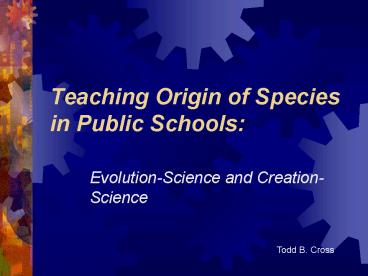Teaching Origin of Species in Public Schools: - PowerPoint PPT Presentation
1 / 15
Title:
Teaching Origin of Species in Public Schools:
Description:
Evolution = theory that the various types of animals and plants have their ... 'the theory of evolution assumes the existence of life and is directed to an ... – PowerPoint PPT presentation
Number of Views:33
Avg rating:3.0/5.0
Title: Teaching Origin of Species in Public Schools:
1
Teaching Origin of Species in Public Schools
- Evolution-Science and Creation-Science
Todd B. Cross
2
The Issue
- Teaching the origin of life in the public school
classroom is currently a large debate - Several states are currently undergoing
legislative procedures
3
Two Theories
- Evolution theory that the various types of
animals and plants have their origin in other
preexisting types and that the distinguishable
differences are due to modifications in
successive generations (Merriam-Webster, 2005) - Creation-science scientific evidence or
arguments put forth in support of creationism
(Merriam-Webster, 2005)
4
Conflict and Misunderstanding
- 1981 the Arkansas legislature
- required balanced treatment of what the bill
termed Evolution-science and Creation-science
(Guest, 1981) - prohibition against religious instruction both
shall be limited to scientific evidence for each
model and inferences from those evidenced
required instruction in both models if the public
school chooses to teach either (Guest, 1981). - Since-continuous debate
5
Public Opinion
- Parents who believe that human life has always
existed in its present form - more likely to give schools a poor rating (32)
for their handling of evolution
- those who believe that live evolved over time
(9)
Only 31 of all respondents rated schools as
excellent or good on evolution (Pew, 2005)
6
Misconception
- Evolution explains the emergence of life
- the theory of evolution assumes the existence of
life and is directed to an explanation of how
life evolved. Evolution does not presuppose the
absence of a creator or God... (Hildemann, 1982)
7
Lack of Understanding
- People opposed to teaching creationism
with/instead of evolution, 27 personally take
the creationist position of human origins (Pew,
2005).
- 19 of people who think creationism should be
taught instead of evolution nevertheless
personally believe in evolution through natural
selection (Pew, 2005)
shows basic misunderstanding of what the theory
of evolution presents the idea of evolution
through natural selection
8
Authority to Decide Curriculum
- 41 think parents
- 54 of these accept creationist account
- Evangelical protestants (59)
- 21 in favor of school board
- (Pew, 2005)
- 28 say scientists and science teachers
- seculars 41
- Accept natural selection 47
- (Pew, 2005)
Parents/Evangelicals-confusion regarding the
meaning of terms such as creationism and even
evolution. (Math Theory)
9
The Curriculum Poll
- 64 support teaching creationism along with
evolution in public schools - 32 creationists do not think it should be taught
instead of evolution - may suggest public believes desirable to offer
more viewpoints where controversial subjects in
the schools are concerned
- 26 oppose this curriculum
- Only among southerners (45) support replacing
evolution with creationism in the schools - Replacing Not the Issue
Hildemann concepts of creation and evolution
are quite compatible if evolution is viewed as a
creative process continuing over many millions of
years (1982).
10
Unregulated Curriculum
- States that w/o legislation regarding the
acceptable teaching material teach evolution as
if it is by law, not as the theory it truly is
(Harvey et al., 1996) - Evolution-science and Creation-science share
common characteristics - each is non-falsifiable overall but is
falsifiable on specific predictions and specific
evidences - each has predominantly circumstantial evidence
- each has presuppositions about a creation
- each includes design
- each historically appeared first in religious
writings - each is consistent with many religious beliefs
and many philosophical beliefs(A model bill
requiring the teaching of creation science in the
public schools, 1982)
11
Current Christian Public High School Teacher
- No limits given to him regarding the allowed
curriculum - Presenting Darwinian evolution so that concepts
are understood using both videos and real life
examples of evolution - Gives the evidence for evolution of life over
time - Presents flaws with evolutionary theory
12
Cont.
- Shares personal beliefs
- Discusses complexity of life
- Necessity for creator
- Reads Genesis account as historical text of
prevailing view - Makes it clear that the ultimate decision is one
of personal theology - Hardly ever complaint
13
Proposal of Best Methods
- Present both major views
- Present Facts and supporting science
- Present weaknesses and arguments against
- Limit theories to their credibility
- Miller Urey not valid explanation for life,
only closest thing (amino acids) - Eliminating bias
- Students are impressionable
- Cannot as Christians limit the possibilities
before experimentation - Remain open
14
- Encourage examination of agreement between
theories - Let students ascribe credibility
- Tell students that they must make a personal
decision about beliefs
15
Literature Cited
- 1982. A model bill requiring the teaching of
creation science in the public schools.
Science, Technology, Human Values. 7(40)
100-102. - Cross, Douglas. Telephone Interview. 11 Nov.
2005. - Guest, William, E.F. Clayton. 1981.
Evolution-Science versus Creation-Science.
Evolution. 35(4) 822. - Harvey, J., P.P. Craig, P.R. Gross, S.J. Madigan.
1996. Teaching evolution. Science.
273(5280) 1321-1322. - Hildemann, W.H. 1982. Science instruction and
religion. Science. 216(4550) 1048. - Miller/Urey Experiment. lthttp//www.chem.duke.edu
/jds/cruise_chem/ Exobiology/miller.htmlgt.
accessed 9 Nov. 2005 - The Pew Forum on Religion and Public Life.
Public Divided on Origins of Life Religion a
Strength and Weakness for Both Parties. 30
August 2005. lthttp//pewforum.org/docs/index.php?
DocID115gt . accessed 8 Nov. 2005 - Merriam-Webster Online. 2005.
lthttp//www.m-w.com/gt. accessed 16 November
2005

